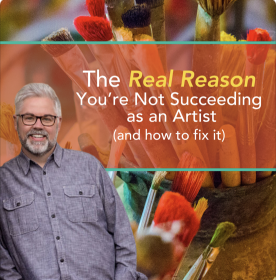Has your art hobby grown large enough that you’re thinking about turning your passion into a business? In this article, I’ll share a few quick tips that will help you know when and how to get started on the road to business success as an artist. I know it will be a big help as you consider starting an art business.
Start with a Call to the Experts
While there’s plenty of sites that offer “free” legal advice out there on the internet for starting your own business, nothing beats professional, local advice if you want to get started on the right foot.
From navigating local, state, and national laws, picking the correct business structure, and exploring the liability and tax implications of owning a business, a good legal advisor and talented financial advisor can help you navigate the decisions you need to make and the steps you need to take as your hobby grows into a business.
Is Now the Right Time?
Once you have your team of experts assembled (attorney and CPA to start with), it’s time to take a look at the state of your art. Do a little cost-benefit analysis with your financial professional, and decide if your hobby has indeed grown into a business. A few of the questions to consider when you’re at a crossroad like this:
Are you regularly investing personal money into your art hobby?
Are you regularly selling your work or teaching art classes?
Is the money you’re making from your art becoming significant enough to replace a part, if not all, of your work income?
Are you making enough money to offset the expenses of having an official corporate structure in place?
As you work with your team of experts, you’ll answer these and many more questions in making this determination. But if you and the experts agree it’s time, then your next move will be to…
Pick Your Business Structure
One of the first things you and your team of advisers will consider is what type of structure you’ll be using to start your art business. Here in the United States, we use three basic types of business structure:
- Sole Proprietorship
- Limited Liability Companies
- Corporations
While I’m no legal expert (and this is not legal advice), here’s a basic overview of each type of business entity you and your team of experts will be considering for your needs.
- Sole Proprietorships are the most basic types of business entity. This type of business always has one and only one owner. Generally, legal documents are needed to start a sole proprietorship because it’s not considered a separate legal entity, different from its owner in the eyes of the law. The advantage is that it’s easy to start, and you’ll have total control of the business, but the downside is that as the owner, you’ll be personally liable for all the debts and liabilities of the business.
- Limited Liability Companies (LLCs) are a step up from the sole proprietorship in terms of both complexity and legal protections for the owner. LLC’s were created as a hybrid of the sole proprietorship and corporation to stimulate small business growth. An LLC blends the simpler legal administration and tax treatment of a Sole Proprietorship with the personal and business liability protection enjoyed by corporations.
- Corporations are the most complex of the three legal entities. These are businesses that are owned by shareholders, managed by a board, and operated by officers. While a corporation does offer excellent liability protections for the owners, the increased fees, the complexity of annual reporting, and changing tax rules often make this a choice best suited for larger ventures.
Want to dive deeper and learn even more? Check out what my friends at LegalZoom have to say on this subject by clicking here.
Looking for more tips?
Listen to what I shared with Bonnie, one of my podcast listeners.
Has your art hobby grown to the point that you’re considering turning your part-time passion into a full-blown business?
In my blog and in this week’s episode of 5-minute mentoring, I’ll be sharing a few quick tips that will help you know when and how to get started on the road to business success as an artist.
Connect with Matt online at https://www.matttommeymentoring.com or on Instagram and Facebook @thethrivingchristianartist
Get encouraged and connect with other artists on the Thriving Christian Artist Facebook Page https://www.facebook.com/thethrivingchristianartist/
Fuel Your Creative Calling with Weekly Encouragement
Join thousands of Christian artists who are growing in faith, creativity, and purpose.
Subscribe to The Thriving Christian Artist Weekly and receive powerful, faith-filled content every week—designed to encourage your heart, spark your creativity, and equip you to walk boldly in your God-given calling as an artist.
? Click here. It’s free. It’s faith-filled. And it’s just for you.
Has your art hobby grown to the point that you’re considering turning your part-time passion into a full-blown business?
In my blog and in this week’s episode of 5-minute mentoring, I’ll be sharing a few quick tips that will help you know when and how to get started on the road to business success as an artist.
Connect with Matt online at https://www.matttommeymentoring.com or on Instagram and Facebook @thethrivingchristianartist
Get encouraged and connect with other artists on the Thriving Christian Artist Facebook Page https://www.facebook.com/thethrivingchristianartist/
Fuel Your Creative Calling with Weekly Encouragement
Join thousands of Christian artists who are growing in faith, creativity, and purpose.
Subscribe to The Thriving Christian Artist Weekly and receive powerful, faith-filled content every week—designed to encourage your heart, spark your creativity, and equip you to walk boldly in your God-given calling as an artist.
? Click here. It’s free. It’s faith-filled. And it’s just for you.
One Last Piece of Advice
Once you’ve determined this is the time to turn our hobby into a business, do it right and do it with integrity. Setting up a business is not the kind of thing you want to leave to chance. Don’t fall into the trap of doing business under the table just because it’s easy and may save you a few dollars.
Walking with integrity in business, setting up your business, taxes, and financial accounts correctly is like weaving a net for the blessing God wants to send your way. If you have huge holes in your net because you’re not thinking and working through the details or because you’re avoiding taxes, then you’re potentially setting yourself up for disappointment and failure.
If an art business is in your future, then begin by finding those experts who can help you determine the best time, the best structure, and the best way to set up a business that will be a blessing to both you and others.



Leave a Reply